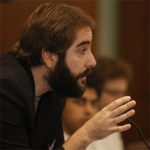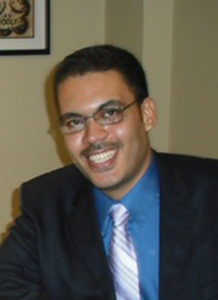DH@MSU Annual Report 2020-2021
2020-21 was, as everyone is fond of saying, a highly unusual year. But despite the physical distance we were all required to maintain, DH@MSU continued its work on building community within the digital humanities on and off campus, hosting well-attended virtual events, teaching remote classes, and supporting the development of a wide range of faculty, staff, and student projects. This work was in its way a test of the digital skills and platforms we develop, study, and use, and the report below details some of our collective accomplishments made possible by our technologies over the course of the year. What it can’t quite demonstrate, however, is how much the human factor continues to matter. We long to return to gathering in person, getting to experience those serendipitous crossings of paths that allow new relationships and new collaborations to develop. We wish all of you a safe and healthy summer, and we hope to see all of you in person before too long.
– Kathleen Fitzpatrick, Director of Digital Humanities
Table of Contents
DH@MSU Committees
The Advisory Committee worked on a Mapping Project to collect resources around campus for the DH community as well as running the new faculty application process and other strategic discussions.
Kate Birdsall (2022)
Scout Calvert (2021)
Amy DeRogatis (2021)
Zach Kaiser (2021)
Sharon Leon (2022)
Alice Lynn McMichael (2021)
Andy Petersen (2022)
Ethan Watrall (2022)
Justin Wigard (Graduate Student Representative)
Kathleen Fitzpatrick (ex-officio) (Chair)
Kristen Mapes (ex-officio)
Joining for 2021-22
Christina Boyles
Megan Kudzia
Stephen Rachman
Stephanie Vasko
The Research Committee created the Microgrant funding program to replace other programs that were incompatible with the pandemic, and also awarded Seed Grant Funding.
Jon Frey (2022)
Sean Pue (2021)
Amanda Tickner (2021) (Chair)
Kate Topham (2022)
Erica Holt (Graduate Student Representative)
Kathleen Fitzpatrick (ex-officio)
Kristen Mapes (ex-officio)
Joining for 2021-22
Matthew Handelman
Kuhu Tanvir
This year, the Curriculum Committee developed a set of learning goals and specialized tracks for the Undergraduate Minor in Digital Humanities.
Julian Chambliss (2021) (Co-Chair)
Ellen Moll (2021) (Co-Chair)
Terence O’Neill (2022)
Natalie Philips (2022)
Daniel Fandino (Graduate Student Representative)
Kathleen Fitzpatrick (ex-officio)
Kristen Mapes (ex-officio)
Kate Rendi (ex-officio)
Joining for 2021-22
Zach Kaiser
Xinqiang Li
Adam Liszkiewicz
The Engagement & Outreach committee organized events for the community and began developing an outreach initiative to alumni of the undergraduate minor and the graduate certificate.
Lorelei Blackburn (Fall 2020)
Max Evjen (Chair)
Sharon Ladensen (Fall 2020)
Kristen Mapes
Natalie Philips
Michael Rodriguez (Spring 2021)
Katie Knowles (Graduate Student Representative)
Tianyi Kou (Graduate Student Representative)
Curriculum
Undergraduate Minor
This year, the Curriculum Committee set out to clarify the requirements and cohesion of the Minor in order to help the program expand in upcoming years.
In Fall 2020, the Committee crafted Learning Goals for the Minor in Digital Humanities. Read the full list of goals on the DH@MSU website.
In Spring 2021, the Committee laid out three tracks for the minor. Discover more about the tracks on the DH@MSU website:
- Global Digital Humanities
- Community Engaged Digital Humanities”
- Data, Ethics and Society
New Advisor

Graduate Certificate
Congratulations to the following graduate students who received the Digital Humanities Certificate in 2020-2021:
- Melissa Klamer (English)
- Jessica Lopez (English)
- Marisa Mercurio (English)
- Justin Wigard (English)
- Taylor Mills (Philosophy)
- Jessi Wright (History)
Events
DH Research Highlights
In Fall 2020, DH@MSU began an annual DH Research Highlights event. Seed Grant recipients reported out on their work over the summer, and Evan Christopherson, the Digital Scholarship Graduate Arts Fellow, presented on their project creating generative/algorithmic digital art based on data gathered from meteorological instruments.
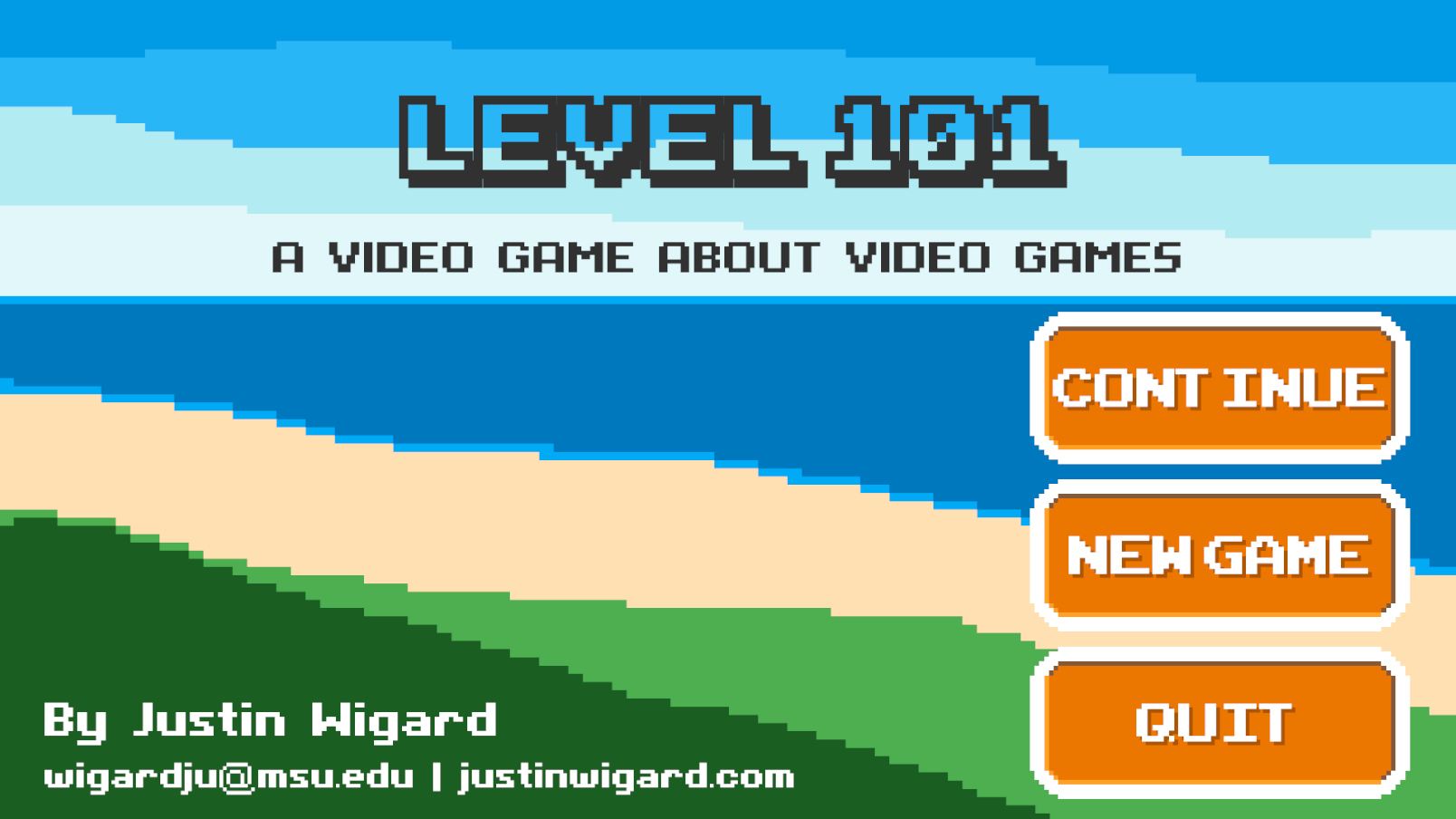
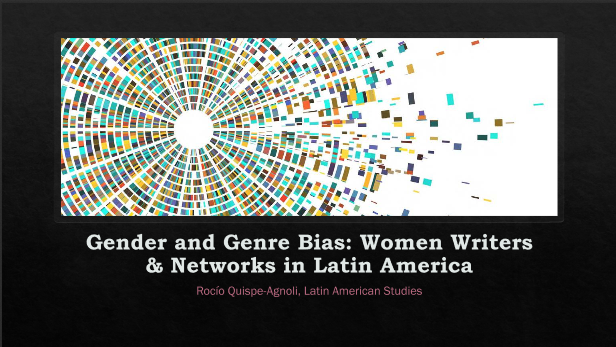
LOCUS Mini-Symposium
Locus is a regular space for faculty and students from MSU to showcase their work, at any stage from idea to completion, in short lighting-talk presentations. The theme for the Fall 2020 LOCUS Mini-Symposium was “Intersections of Digital Technology and Gender Studies.”
Distinguished Lecture
DH@MSU continued the annual Distinguished Lecture to the community, in which a speaker from off campus showcases their work. For 2020, the Distinguished Lecture was presented virtually by Victoria Szabo, Research Professor of Art, Art History, and Visual Studies, Duke University, on “The Virtual in the Digital: Post-DH Approaches to Collaborative Scholarly Practice.”

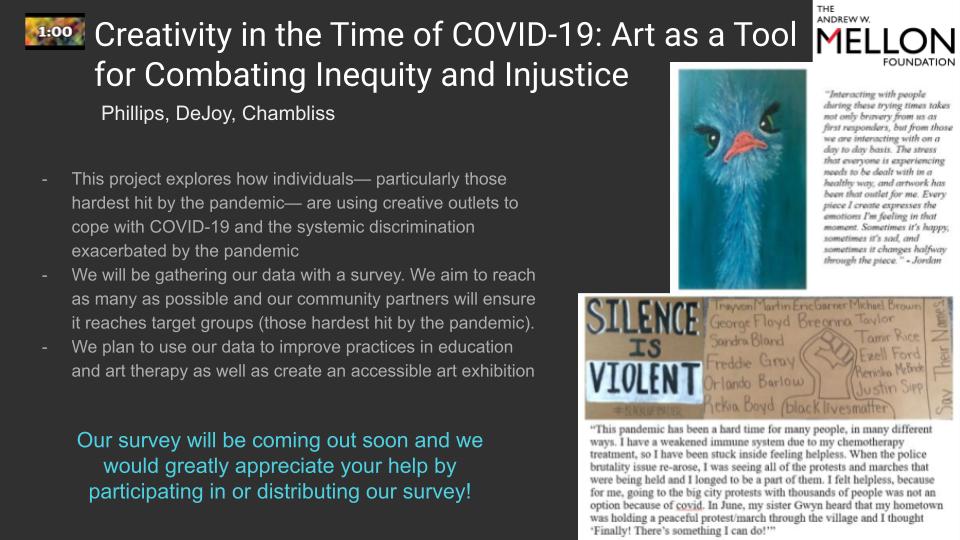
THATCamp
THATCamp is a gathering where the agenda is set by attendees on the day of the event based on what people want to learn and/or share. These events gave community members an opportunity to network, explore skills and interests, and share about their work.
Planning Committees:
August 2020 – Megan Kudzia, Max Evjen, Katie Knowles, Kristen Mapes
January 2021 – Soohyun Cho, Max Evjen, Tushya Mehta, Leah Morin, Lorelei Blackburn, Kristen Mapes – pivoted to a shorter, 2 hour format, saw 20 participants engaged on the day
Global Digital Humanities Symposium
The 6th annual Global Digital Humanities Symposium was held virtually on April 12th-15th.
Over 160 people attended through the Zoom meeting and the livestream over the course of the four days.
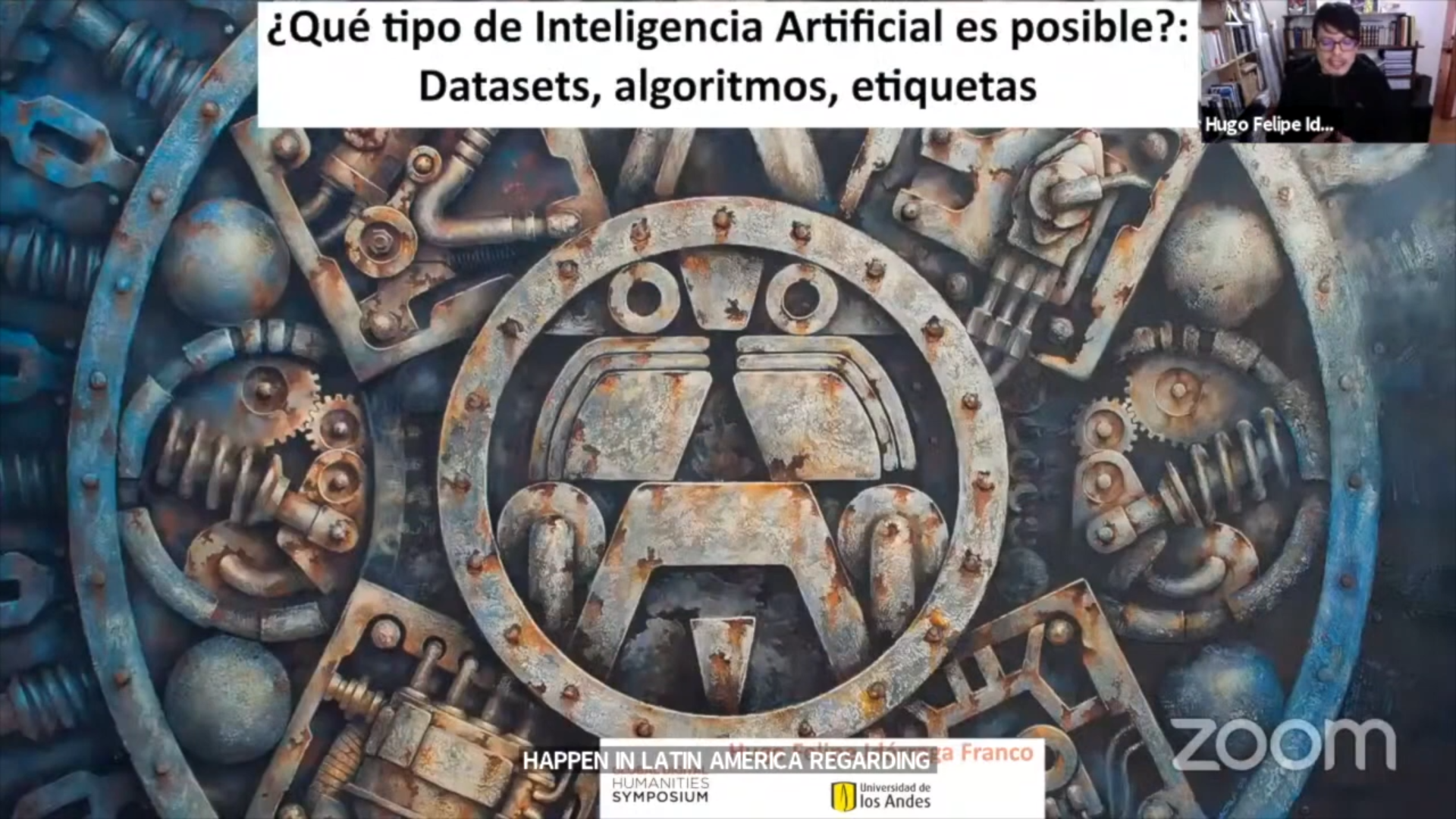
For the first time, the Symposium supported presentations in Spanish and French and provided interpretation between Spanish and English and between French and English. Closed captions were also provided throughout the event.
The Symposium included speakers from around the US, Canada, Brazil, Kenya, Mexico, Finland, Columbia, Germany, Argentina, Australia, Chile, France, Uruguay, and Portugal.
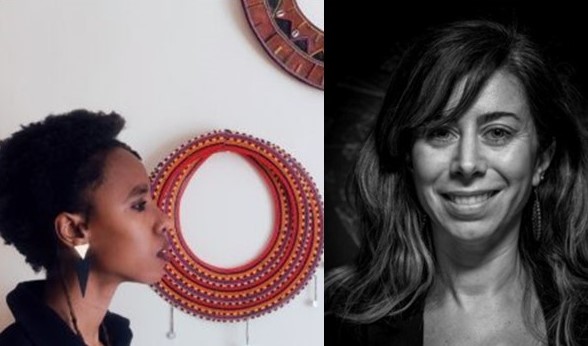
The keynote speakers were Chao Tayiana Maina (left) and Gimena Del Rio Riande (right).
Chao Tayiana Maina gave the first keynote address, discussing historical empathy in archival practice through her work with African Digital Heritage and the Open Restitution Africa project.
Gimena Del Rio Riande gave the second keynote, discussing equity in digital access and the effect of globalization on Digital Humanities.
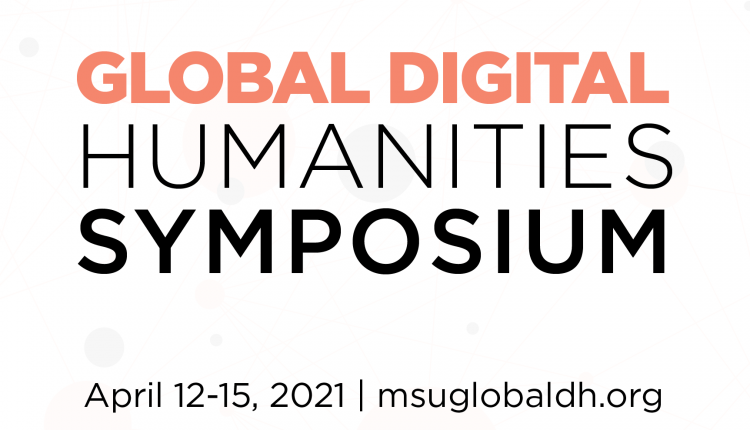
The Symposium gathered work from the event together into a Proceedings website for the first time in 2021, using the Humanities Commons platform to deposit materials in the CORE repository and to showcase the work on a site. Thirteen presentations are included for this year, and the site will grow in each future year of the Symposium.
Digital Engagement
Digital Strategy
In February 2020 DH@MSU approved a three-year Digital Strategy (available with MSU login). Using the Digital Engagement Framework we arrived at the following strategic goals, all relating to Co-Created Value:
Audiences will use DH@MSU resources to accomplish their own work through the following strategic areas:
- Join the DH Conversation
- Get DH Training
- Join DH@MSU Community
- Tell the DH@MSU Story
Initiatives
Digital Engagement Initiatives include:
Ongoing:
- Newsletter (204 subscribers)
- Email listserv (213 subscribers)
- Slack (238 members)
New in 2020:
- Update to the DH@MSU website homepage
- @DHatMSU Twitter (275 followers)
- @MSUGlobalDh Twitter (88 followers)
Research
With MSU-sponsored travel on hold, the Research Committee created a new Microgrant Funding Program, which replaced the Conference Funding and Summer Program Funding programs. Faculty and students could apply for up to $500 towards equipment, virtual conference attendance, consulting fees, software, etc to support DH work.
- Andy Petersen, for a 3D printer for the Archivo de Respuestas Emergencias de Puerto Rico project
- Alexandra Hidalgo, for consulting fees for A Family of Stories project
- Danielle Wilcutt, for equipment for digital archiving projects
The Graduate Arts Fellowship, begun in 2020, is a joint program between the College of Arts and Letters and MSU Libraries to support the creation of art that takes advantage of the technologies and expertise offered through the Digital Scholarship Lab.
Ke’Shunta Faye Drake, graduate student in the English Department, received the $5000 summer Fellowship to work on a project archiving and telling the stories of Black life in Mississippi. Her work will be presented in early Fall 2021 in the Digital Scholarship Lab.
In its fourth year, the Seed Grant Funding program provides funds up to $2000 to support DH projects over the summer. Funding recipients meet periodically over the summer to build cross-project community, present on their work in in the Fall, and share project reports.
- Stephanie Vasko, “Synthesizing the Sound of Space”
- Jessica Stokes, “Materializing Multiple Futures: Printing Jatayu’s Wing”
- Christina Boyles, “Archivo de Respuestas Emergencias de Puerto Rico (The Puerto Rico Disaster Archive)”
- Kate Birdsall, “The Cube: Superheroes Die in the Summer”
Additional Funding Opportunity – June 2021
Due to the unusual nature of the 2020-21 year and the attendant shift in programming and spending, DH@MSU was able to offer an additional funding opportunity in June 2021.
- Kate Birdsall, student worker in the Cube
- Daniel Fandino, purchase software for Washington Heights, Tokyo project
- Megan Kudzia, virtual conference and training for Collapse and Rebirth project team
- Ben Lauren, studio time and audio engineers
- Betsy Sneller, student worker for MI Diaries project
- Ramya Swayamprakash, student worker for rivers mapping project
- John Vsetecka, travel and materials funds for Soviet Ukraine project



